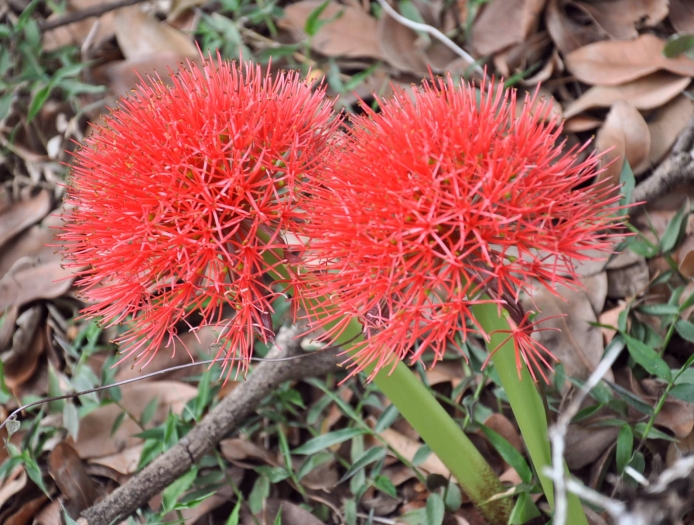African Blood Lily
(Scadoxus multiflorus)
African Blood Lily (Scadoxus multiflorus)
/
/

BetterWORLDphoto
CC BY-SA 3.0
Image By:
BetterWORLDphoto
Recorded By:
Copyright:
CC BY-SA 3.0
Copyright Notice:
Photo by: BetterWORLDphoto | License Type: CC BY-SA 3.0 | License URL: https://creativecommons.org/licenses/by-sa/3.0 | Uploader: Peter coxhead | Publisher: Wikimedia Commons | Title: Vegetation_around_Victoria_falls.jpg |





















































Estimated Native Range
Summary
Scadoxus multiflorus, commonly known as African Blood Lily, is a deciduous perennial bulb native to a range of habitats including open woodlands, grasslands, and the understory of forests in Central and Southern Africa. It typically grows to a height of 1-2 feet and a width of 0.8-2 feet. The plant forms a striking spherical inflorescence composed of numerous small flowers, ranging in color from yellow to pink and bright red, which bloom in the summer and are highly showy. The foliage is lush and broad, adding to its ornamental value.
African Blood Lily is valued for its dramatic and vibrant flower heads, which make it a focal point in any garden setting. It is often used in borders, as a specimen plant, or grown in containers where climates do not support year-round outdoor growth. It requires well-draining soil and can tolerate a range of light conditions from full sun to part shade. While it prefers consistent moisture, it is important to avoid waterlogged conditions to prevent bulb rot. After flowering, it goes dormant, and the bulbs can be stored dry until the next growing season. There are no major disease problems, but it can be susceptible to mealybugs and aphids. It is not considered invasive but should be protected from frost to prevent damage to the bulb.CC BY-SA 4.0
African Blood Lily is valued for its dramatic and vibrant flower heads, which make it a focal point in any garden setting. It is often used in borders, as a specimen plant, or grown in containers where climates do not support year-round outdoor growth. It requires well-draining soil and can tolerate a range of light conditions from full sun to part shade. While it prefers consistent moisture, it is important to avoid waterlogged conditions to prevent bulb rot. After flowering, it goes dormant, and the bulbs can be stored dry until the next growing season. There are no major disease problems, but it can be susceptible to mealybugs and aphids. It is not considered invasive but should be protected from frost to prevent damage to the bulb.CC BY-SA 4.0
Plant Description
- Plant Type: Bulb
- Height: 1-2 feet
- Width: 0.8-1.5 feet
- Growth Rate: Moderate
- Flower Color: Red, Orange
- Flowering Season: Summer
- Leaf Retention: Deciduous
Growth Requirements
- Sun: Full Sun, Part Shade
- Water: Medium
- Drainage: Fast
Common Uses
Bird Garden, Low Maintenance, Potted Plant, Rock Garden, Showy Flowers
Natural Habitat
Native to open woodlands, grasslands, and forest understories in Central and Southern Africa
Other Names
Common Names: Blood Lily, Ball Lily, Fireball Lily, Blood Flower, Katherine-Wheel, Oxtongue Lily, Poison Root, Powderpuff Lily, Boll-Lilja
Scientific Names: , Scadoxus multiflorus, Haemanthus multiflorus, Amaryllis multiflora, Haemanthus andrei, Haemanthus bequaertii, Haemanthus seretii, Nerissa multiflorus, Nerissa multiflorus publ,
GBIF Accepted Name: Scadoxus multiflorus (Martyn) Raf.